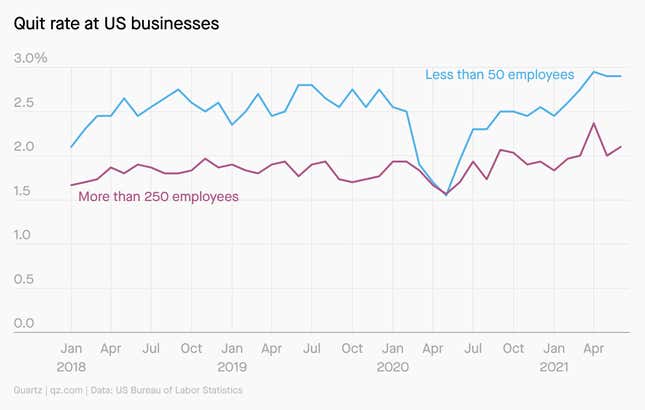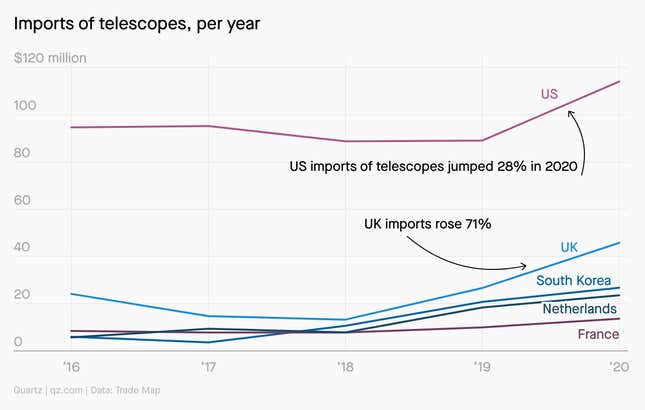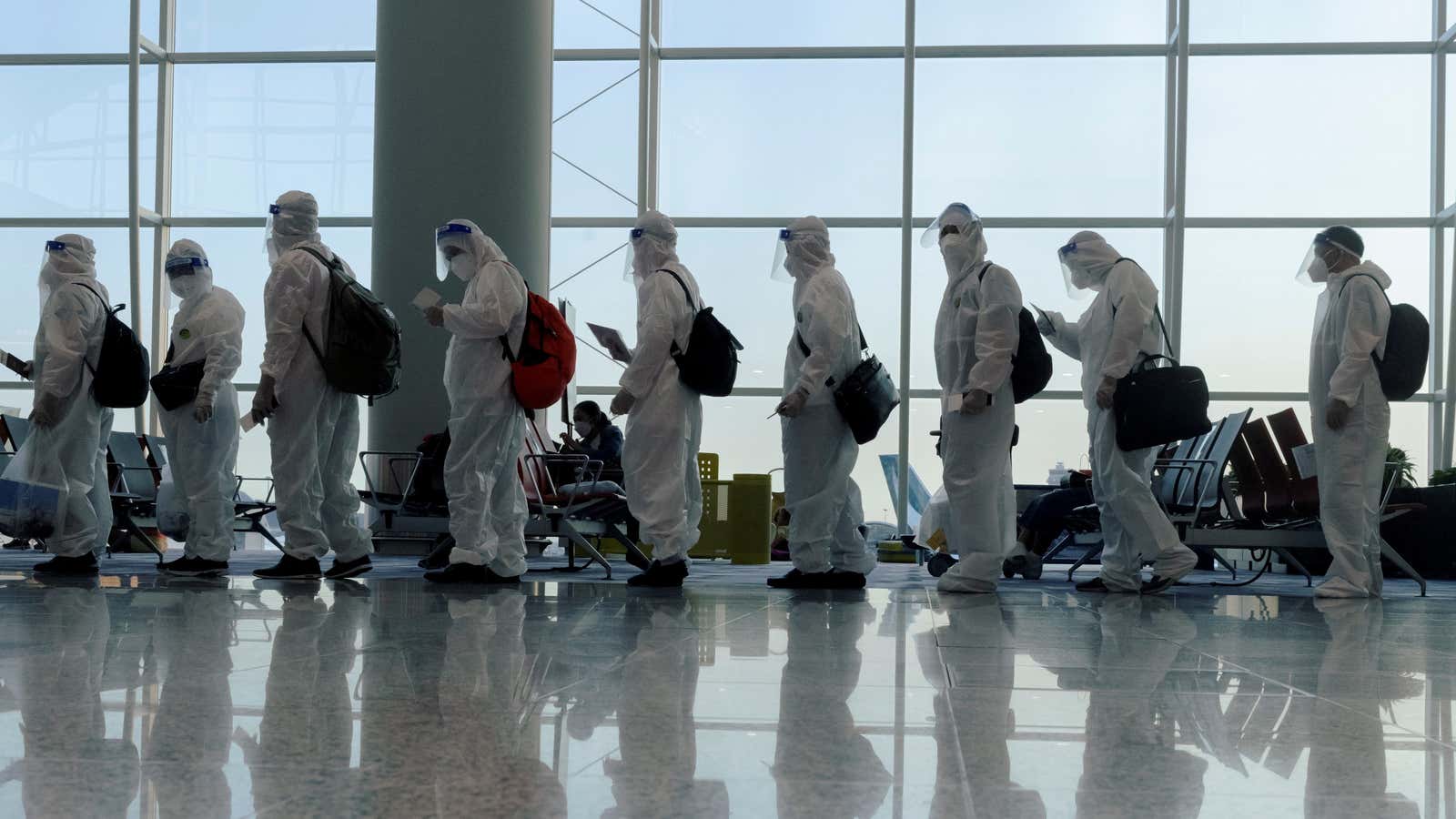Hi Quartz readers,
Social media backlash is gathering steam in China against Zhang Wenhong, a top doctor who had become one of the country’s most trusted experts on Covid-19. Why? He suggested China learn to live with the disease.
“China’s future approach must both ensure…interconnection with the world and returning to a normal lifestyle, and also protecting citizens from fears of the virus,” Zhang wrote (link in Chinese) on his Weibo page on July 29, as the delta variant hit the country. “China should have this kind of wisdom.”
While Zhang’s critique was subtle, China’s former health minister clapped back in an Aug. 9 op-ed (link in Chinese) that accused western countries of “blindly” pursuing a “living with Covid” strategy, and questioned Chinese experts advocating for a similar approach. Since then, a teacher in the Jiangxi province was reportedly detained for making “inappropriate remarks” about coexisting with Covid.
Beijing’s growing sensitivity to this kind of talk highlights how important a Covid-zero strategy is to China’s leaders. After early backlash over its suppression of information, China was soon able to point to its success in containing the pandemic as proof of the one-party system’s superiority. Public opinion of Beijing’s pandemic performance is high in China, and helped by propaganda that praises “centralized leadership” (link in Chinese). Internet users often joke that other nations should “copy China’s homework” on handling Covid-19.
Zhang’s view, however, is starting to gain traction among bloggers and scholars, some of whom compare him to Li Wenliang, a doctor whistleblower who was among the first to share information about the virus. Supporters warn they need to protect Zhang, as they failed to do for Li, who died of Covid-19 last year. But consensus on China’s policies remains far out of reach.
“China has been basically Covid-free for over a year and individuals want to keep it that way,” says Linghao Bao, an analyst with Beijing-based consultancy Trivium China. “The public will be very upset about any new Covid deaths and will blame the government for it. Mishandling Covid comes with a huge political cost.” —Jane Li
You asked…
…a lot of questions! We tried to tackle them all.
- How many variants are there now? The CDC has identified at least seven, but not every variant is cause for concern.
- What’s up with mixing vaccines? We have limited data at this point, but mixing doses has not yet resulted in severe side effects.
- Do vaccine passports work? There’s some evidence that they do, though governments are trying to balance effectiveness against privacy concerns.
- How many children are hospitalized with Covid? Hospitalizations of US kids ages 10-17 climbed 31% last week over the previous seven-day average. But the overall portion of kids being hospitalized remains small.
- Is it safe to send kids back to school? Based on delta’s run in the UK and India, the US should start seeing a decline in cases. But some families may decide to take extra precautions.
- How can I thank you for all the intel? OK you didn’t ask that one, but the answer is by supporting our journalism with a Quartz membership.
I just can quit you
The latest US labor market report offered encouraging signs for American businesses: The unemployment rate fell to 5.4% in July from 5.9% a month earlier. But a closer look reveals a disparity between small businesses and large ones: The Great Resignation is hitting small businesses hardest.

Talking points
🤔 44% of US workers might quit if their job requires vaccination. But 38% would consider quitting if their workplace did not require vaccination.
🏢 WeWork has a new lease on life. The remote workforce is expected to grow, which means workers will be looking for more options to escape the home office.
🚗 America’s used-car bubble has burst. The US consumer price index for used vehicles rose just 0.2% in July, after climbing at least 7.3% in each of the previous three months.
🎵 Lollapalooza was not a super-spreader event. The four-day music festival drew 385,000 people to Chicago, but attendees had to show proof of vaccination or a negative Covid test.
💸 Some people are WFH to work two jobs. Why be good at one gig, the thinking goes, when you can get two paychecks for being mediocre at two?
🔒 Africa’s low vaccination rates are a global security issue. Because vaccines and tests are scarce on the continent, it’s virtually impossible to identify the size of outbreaks.
💡 Major life decisions are hot right now. If you’re in the midst of one, an economist suggests making the choice that comes with change.
Words of wisdom
“It’s a hard time to be rigid about demanding that people come back to the office… There could be a productivity hit if employees are spending days in their office, but they’re totally anxious and on guard the whole time.” —Marianne Cooper, a sociologist at Stanford’s VMWare Women’s Leadership Innovation Lab
As delta cases surge in the US and elsewhere, many companies have postponed their return to the office, or ditched it entirely. That’s good! While some jobs need to be done IRL, any company that managed remote work during the pandemic can presumably keep it up. Yes, because of the public health threat, but also for employees’ well-being.
Twinkle twinkle
If you’re watching the Perseids meteor shower this month, you’re not alone: Stargazing took off during the pandemic. The top importers of telescopes have increased their volumes over the past year, most notably in the US. But buyer beware—rising demand means telescopes are now in short supply.

Elsewhere on Quartz
- The truck stops here: Toyota seemed to know the Taliban would take Kabul.
- The third degree: Beijing’s private-tutoring crackdown is upending lives in China.
- Cheap trick: Conscious consumerism wasn’t supposed to be a substitute for laws.
- It’s elementary: The US is digging into its tax toolkit to rebuild its rare earth industry.
- What not to wear: A $1 billion space suit is holding up NASA’s 2024 moon landing.
Our best wishes for a healthy day. Get in touch with us at [email protected], and live your best Quartz life by downloading our iOS app and becoming a member. Today’s newsletter was brought to you by Jane Li, Manavi Kapur, Sarah Todd, Clarisa Diaz, and Kira Bindrim.
